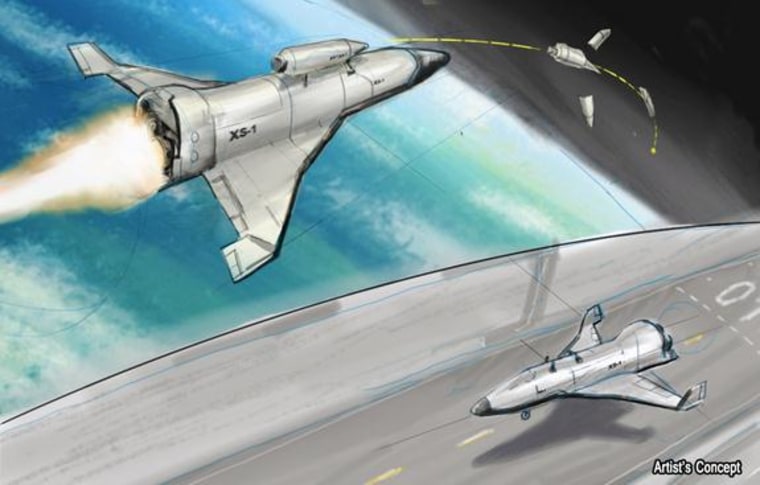The U.S. Defense Advanced Research Projects Agency requested $27 million in 2015 for XS-1, a concept for a reusable space plane that could ultimately fly 10 times in 10 days and boost payloads into low-Earth orbit for less than $5 million per launch. The program received $10 million in 2014.
The agency expects to spend some $800 million on space programs from 2015 through 2018, an increase of $130 million over what was projected at this time last year, Defense Department budget documents show.

"Technologies derived from the XS-1 program will enable routine space launch capabilities with aircraft-like cost, operability and reliability," a DARPA announcement from November 2013 reads. "The long-term intent is for XS-1 technologies to be transitioned to support not only next-generation launch for government and commercial customers, but also global reach hypersonic and space access aircraft."
The agency hopes to select a single vendor next year for the final design and development of the vehicle, which could make its initial test flight in 2018.
DARPA sees the program potentially transitioning to the Air Force, the Navy or a commercial operator, the budget documents said.
The budget request also includes $55 million for the Airborne Launch Assist Space Access (ALASA) program, which is intended to field a system to launch satellites weighing up to 100 lbs (45 kilograms) for $1 million each. The agency requested $42 million for the program in fiscal year 2014.
DARPA awarded ALASA system concept studies contracts last year to Boeing, Lockheed Martin and Virgin Galactic, and technology-development contracts to three other companies.
The program is aiming for a demonstration launch in fiscal year 2015.
The request discontinues funding for two programs: an experimental solar electric propulsion vehicle and system F6, a planned formation-flying satellite demonstration that was canceled last year.
- Mike Gruss, Space.com
This is a condensed version of a story that appeared in Space.com. Read the entire article here. Follow Mike Gruss on Twitter: @Gruss_SN.
- Space Planes: Evolution of the Winged Spaceship (Infographic)
- More News from SpaceNews
- Photos: X-37B Space Plane - The Orbital Test Vehicle
Copyright 2014 SPACE.com, a TechMediaNetwork company. All rights reserved. This material may not be published, broadcast, rewritten or redistributed.